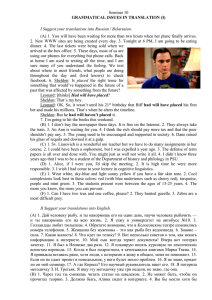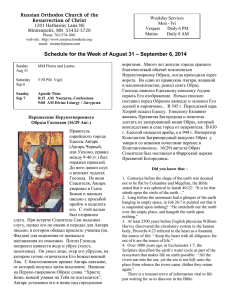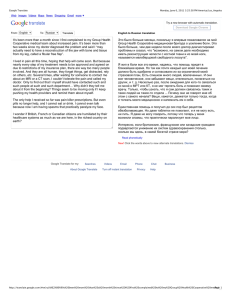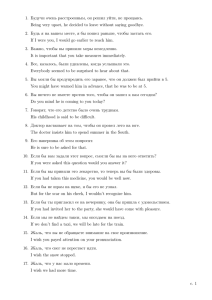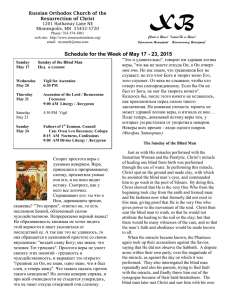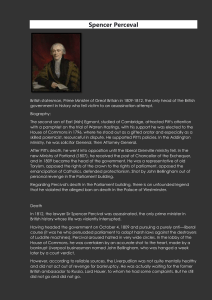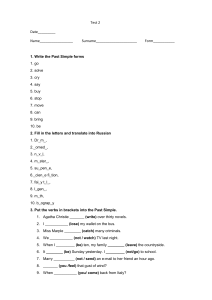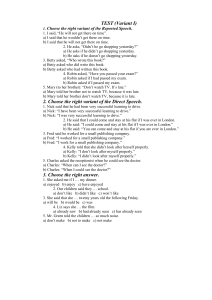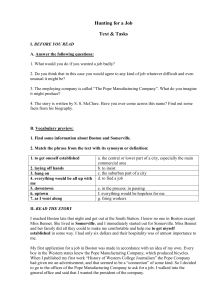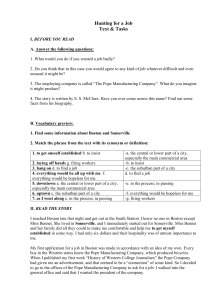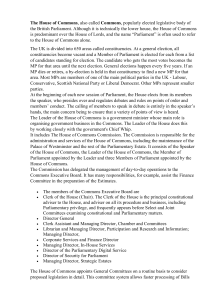Билль о правах Великрбритании
реклама
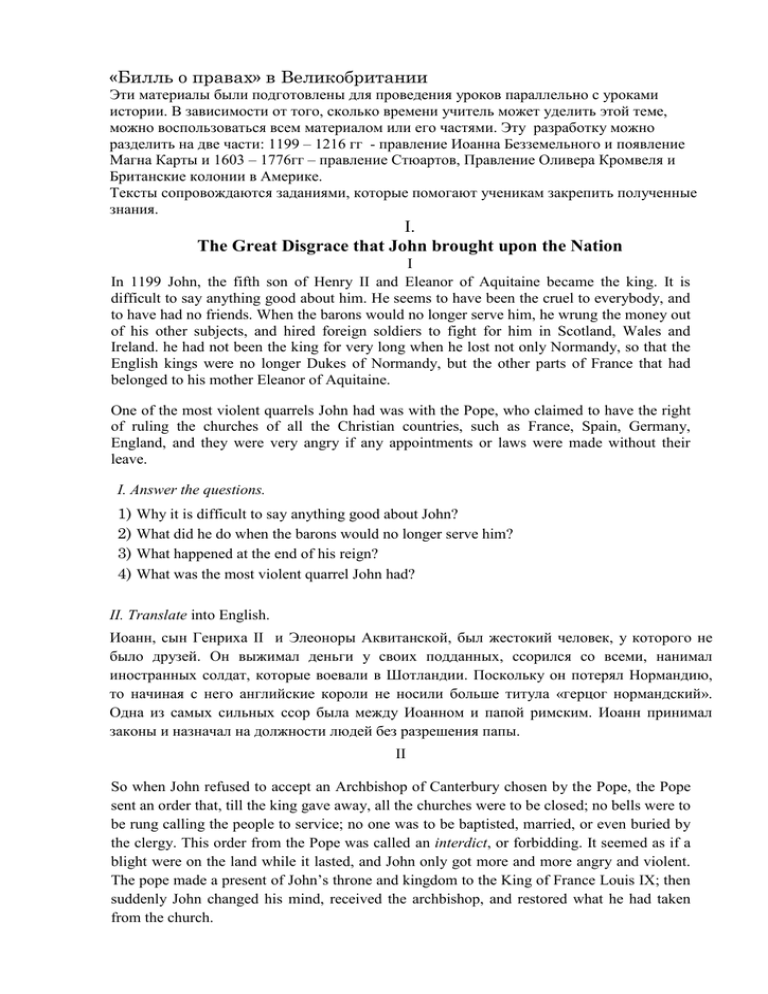
«Билль о правах» в Великобритании Эти материалы были подготовлены для проведения уроков параллельно с уроками истории. В зависимости от того, сколько времени учитель может уделить этой теме, можно воспользоваться всем материалом или его частями. Эту разработку можно разделить на две части: 1199 – 1216 гг - правление Иоанна Безземельного и появление Магна Карты и 1603 – 1776гг – правление Стюартов, Правление Оливера Кромвеля и Британские колонии в Америке. Тексты сопровождаются заданиями, которые помогают ученикам закрепить полученные знания. I. The Great Disgrace that John brought upon the Nation I In 1199 John, the fifth son of Henry II and Eleanor of Aquitaine became the king. It is difficult to say anything good about him. He seems to have been the cruel to everybody, and to have had no friends. When the barons would no longer serve him, he wrung the money out of his other subjects, and hired foreign soldiers to fight for him in Scotland, Wales and Ireland. he had not been the king for very long when he lost not only Normandy, so that the English kings were no longer Dukes of Normandy, but the other parts of France that had belonged to his mother Eleanor of Aquitaine. One of the most violent quarrels John had was with the Pope, who claimed to have the right of ruling the churches of all the Christian countries, such as France, Spain, Germany, England, and they were very angry if any appointments or laws were made without their leave. I. Answer the questions. 1) Why it is difficult to say anything good about John? 2) What did he do when the barons would no longer serve him? 3) What happened at the end of his reign? 4) What was the most violent quarrel John had? II. Translate into English. Иоанн, сын Генриха II и Элеоноры Аквитанской, был жестокий человек, у которого не было друзей. Он выжимал деньги у своих подданных, ссорился со всеми, нанимал иностранных солдат, которые воевали в Шотландии. Поскольку он потерял Нормандию, то начиная с него английские короли не носили больше титула «герцог нормандский». Одна из самых сильных ссор была между Иоанном и папой римским. Иоанн принимал законы и назначал на должности людей без разрешения папы. II So when John refused to accept an Archbishop of Canterbury chosen by the Pope, the Pope sent an order that, till the king gave away, all the churches were to be closed; no bells were to be rung calling the people to service; no one was to be baptisted, married, or even buried by the clergy. This order from the Pope was called an interdict, or forbidding. It seemed as if a blight were on the land while it lasted, and John only got more and more angry and violent. The pope made a present of John’s throne and kingdom to the King of France Louis IX; then suddenly John changed his mind, received the archbishop, and restored what he had taken from the church. I. Answer the questions. 1) What kind of order did the pope sent? 2) What was this order called? 3) What present did the pope make to the King of France? 4) What were John’s final reactions? II. Translate into English. Иоанн отказался принять архиепископа Кентерберийского, выбранного папой. Папа отдал приказ, что пока король не уступит, все церкви будут закрыты. Колокола больше не звали своим звоном людей на службу. Священники не крестили, не венчали и не хоронили людей. Уныние овладело людьми. Иоанн неожиданно изменил свое решение, принял архиепископа и вернул все, что забрал у церкви. III And now, see what a disgrace John inflicted on the proud, independent spirit of the nation. To show his submission to the Pope, he took off his crown and handed it to the Pope's messenger, receiving it back again as a gift from the Pope. John's letters about this time are dated from Dover, which reminds us of the story of his riding from place to place, from Windsor to the ports between Sandwich and Rye, and then crossing to the Isle of Wight, anxiously looking for the help from abroad which never came. In the British Museum hangs a copy of the Great Charter, often called by its Latin name, Magna Carta. It was forced from John, with great courage and difficulty, by the barons. In it he had promised certain rights to the people, so that they might live in safety under good government. This Great Charter, which is often called the foundation-stone on which liberty is built, was drawn up from the charter which Henry II gave to the people when he became king, which, again, was established upon the laws of Edward the Confessor and Alfred. I. Answer the questions. 1) What disgrace did John bring upon the nation? 2) Why did John ride from place to place? 3) Where did he ride? 4) What hangs in the British Museum? 5) How was the Great Charter forced? 6) What had he promised in it? 7) What was it drawn up from? II. Translate into English. Великую хартию бароны силой получили от Иоанна. Ее часто называют основой, на которой построена свобода. Она составлена на основе хартии Генриха II. А та, в свою очередь, основана на законах Эдуарда Исповедника и Альфреда. Великую хартию вольностей часто называют по-латыни Магна Карта. Копия ее висит в Британском музее. IV You would like to hear what sort of promises are made in that cramped Latin writing, among them are these: 1. The King was not to make the people pay taxes without the consent of the Great council. 2. No one was to be punished for any wrong-doing without a proper trial according to the law of the land. There is a little island on the Thames, near Windsor, called Magna Carta Island, and on it John met the barons to put his seal on a lump of wax to show that he “signed” and consented to keep the promises set out in the Charter. He was in a furious state of anger all the time. It is said that as soon as the deed was done “he threw himself on the ground, gnashing his teeth, and gnawing sticks and straws in his rage.” The pope soothed him, and said he need not keep his word, and crowds of foreign soldiers came to help John to burn and rob and kill all over the country. It was a troubles time. Louis of France evidently felt he was going to take John’s place – you can see amongst the charters a grant from him, giving away the town of Grimsby. Then the end came suddenly. John had to cross the Wash, that broad inlet between Lincolnshire and Norfolk. When the tide is out there are miles of sands, and the long train of carts and wagons which were carrying the king’s treasures were lost in soft quick sands as the tide came flowing in. Quite recently a handsome cup was washed up near the shore of the Wash, and it is believed to be part of this lost treasure of King John. The grief and sorry of this caused John’s death I. Answer the questions. 1. Why is a little island on the Thames called Magna Carta Island? 2. In what temper was John when he signed the Great Charter? 3. How did he do this? 4. What happened as soon as the deed was done? 5. What caused John’s death? II. Translate into English. На Темзе, около Виндзора, есть маленький остров. Его называют Магна Карта. На этом острове Иоанну пришлось поставить свою печать на куске воска. Это означало, что он выполнит обещания, изложенные в хартии. Иоанн был взбешен. Он бросился на пол и в ярости стал грызть палки, солому и скрежетать зубами. С одобрения папы Иоанн не сдержал слово. Наступили смутные времена. Толпы иноземных солдат ходили по стране, жгли грабили и убивали. Конец пришел неожиданно. Иоанн потерял все свои сокровища в зыбучих песках бухты между Линкольнширом и Норфолком во время прилива. Он не смог оправиться от такого потрясения и умер. II The beginning of the great war between the king and the people I When Queen Elizabeth I died in 1603, a messenger came to tell James Stuart about her death and did the journey in a few days. A few lords attended James IV of Scotland and they ambled along through the heart of the quiet country. So secure did James feel about the succession to the English crown that his journey south was a sort of pleasure excursion. Three centuries had passed since the old Hammer of Scots, Edward I, had so ardently desired that the north and south kingdoms should be united under one ruler – three centuries of constant war, now on one side, now on the other, of the Border. Yet the desired union of the crowns did not come about on the battlefield, but peacefully by inheritance, and by the request of Parliament, and her cousin, king James IV of Scotland, was crowned James I of England in the old coronation chair, over the old block of stone, called the Stone of Destiny, that Scots so hated to lose. For another hundred of years the two countries had their own Parliaments and governments, but under the last of the Stuarts the union became complete. I. Answer the questions. 1. Did Edward’s wish come true? 2. How did the two crowns unite? 3. When did the union become complete? II. Translate into English. Курьер с юга, сообщивший Якову (Джеймсу) Стюарту о смерти Елизаветы, проделал весь путь всего за несколько дней. Путешествие Якова на юг было чем-то вроде экскурсии. Его сопровождали несколько лордов, потому что он был спокоен по поводу своего права наследовать. Объединение северного и южного королевств, о котором мечтал Эдуард, свершилось. Это произошло не на поле боя, а мирно, по наследству. II In the Stuart times England began to spread beyond her old sea boundary. James set his heart on finding gold and treasures that could be brought over the ships. What really was needed was for English people to go over the ocean and make new homes in the New World, and found states to be governed by the same laws at home. Then the settlers, or colonists, must cultivate their new estates and grow food, not only for themselves, but for other parts of the world. The first settlers from every country had hard times to bear, and much failure. It was Sir Walter Raleigh who named England’s first colony after Queen Elizabeth, Virginia, and James gave it a charter. By this time Spain, Portugal, France, all had dominions on each side of the Atlantic, and very soon struggles and fights about the new land arose, which led to nearly two centuries of war amongst the five greater nations on Europe. When ocean became a pathway to the New World, instead of a boundary to the old, each nation wished to be mistress of the seas, and to have the greatest number of ships upon them, manned by the most daring sailors. They wanted to protect their countrymen as they passed to and fro, whether they were bringing home rich treasures or carrying goods for other countries. I. Answer the questions. 1. What is Sir Walter Raleigh famous for? 2. How it was necessary to use the lands in the New World? 3. Why the first English colony is named Virginia? 4. How did the discovery of new lands lead to war? II. Translate into English Во времена Стюартов Англия начала выходить за пределы старых морских границ. Пока страны к востоку от Атлантического океана осознали масштаб открытий, прошел весь 16 век. Первые колонисты столкнулись с множеством трудностей. Первую английскую колонию назвали в честь королевы Елизаветы. Вскоре у многих европейских стран появились доминионы в Новом свете. Между этими странами началась борьба за новые земли и за право быть хозяйкой морей. III James I had even stronger ideas about the rights of kings than the Tudors; he believed that not only that as a king he could rule and do as he liked; but that because he was a king, he could do no wrong. This belief, which he passed on to his sons, caused great trouble in England; and freedom had once more to fought for. Differences in religion had a good deal to do with sending people across the Atlantic, to settle in a land where they hoped to have more freedom. Those who preferred a simpler form of worship than used in England were among the first to go, and gradually the fringe of Englishspeaking colonies spread along the coast of North America to the Spanish settlements in Florida. It was in 1620 that a little ship called the Mayflower crossed the stormy Atlantic, with about one hundred passengers (102 people – 40 men, 20 women and children) on board. The long and miserable passage was no pleasure trip to the sad and earnest folk, and no warm welcome or comfortable quarters awaited them when at last they set foot on shore. And the American nation feels it honour to be descended from the determined, God-fearing band of men and women who left all in the Old World that they might have the freedom denied them at home. I. Answer the questions. 1. What ideas did James I have about the rights of kings? 2. What religious differences were there in England at that time? 3. Why did people want to settle in North America? 4. What do you know about the ship called the Mayflower? II. Translate into English. Яков верил, что король имеет право поступать так, как он хочет. Это убеждение он передал своим сыновьям, и оно причинило Англии много проблем. Из-за разницы в религии многие люди отправились через Атлантику. Oни начали селиться в Новом Свете, чтобы получить больше свободы. Постепенно вдоль берега северной Америки образовалась каемка англоговорящих колоний. Корабль «Мэйфлауэр» пересек Атлантику с сотней пассажиров на борту. После долгого путешествия их не ждал радушный прием. Американская нация считает за честь происходить от этих упорных и богобоязненных людей. IV As soon as Charles I, the second son of James I, began his reign in 1625, he showed that he believed even more strongly than his father that, being a king, he could do no wrong, and was thus above all law and able to rule as he chose. Englishmen had been fighting for hundreds of years to make it certain that the sovereign of the country should rule by law, and Charles’s doings roused the nation into steadfast resistance. In 1625 – 1628 Charles dissolved Parliament three times and in 1629 he did it for the fourth time and ruled without one for nearly 12 years. During this time he trampled more and more heavily on the liberties of the country, and many people joined the Mayflower emigrants across the sea. One of the many unjust things Charles did to exasperate the people was to force money from them in ways not allowed by law. When at last Parliament was called together again, a great leader was found in Pym, who had the splendid gift of being able to speak so well that he could persuade men to do as he wished. The king burst one day into the House of Commons in a rage, demanding that Pym and his friends should be given up to him. That was the burst of the storm. The country rose and armed men to fight the Parliament and the nation against the king and nobles. The Civil War began. I. Answer the questions. 1. Did Charles believe the same things about the rights of the kings as his father? 2. Why did the English nation resist Charles’s doings? 3. How did Charles rule without the Parliament? 4. Who was the new leader of the Parliament? 5. How did the Civil War begin? II. Translate into English. Как только началось правление Карла I, он показал, что еще больше своего отца верил в то, что король всегда прав. Англичане много веков боролись за то, чтобы монарх правил по закону. Действия Карла побудили их к стойкому сопротивлению. Карл распустил парламент и почти 12 лет правил без него. Он все больше попирал права и свободы народа. Карл вынуждал людей платить налоги, не разрешенные законом. Вскоре началась война между королем и народом. Oliver Cromwell and the Commonwealth I It was Oliver Cromwell, a plain country gentleman, who farmed his rich grass meadows, sat in Parliament with Pym, who turned a brilliant soldier, and raised a model army, one of the finest armies ever seen. He trained and disciplined them, and fired them with an intense desire to fight for freedom in religion and government. They were able to meet the soldiers of Charles, long used arms; these were the Ironsides. It was they who turned the tide against Charles. He was caught; his possessions were captured, for some time he was kept at various castles. A little later he was brought to London. In the famous Westminster Hall Charles was tried for taking away the liberties of the people and then condemned to death. Outside the Banqueting Hall of the Place of Whitehall he was beheaded in the sight of his people. His dignity and charm made many people love him and pity his cruel fate. I. Answer the questions. 1. What did Oliver Cromwell do before going to London? 2. How did Cromwell train his army? 3. How was the Parliament’s army called? II. Translate into English. Оливер Кромвель был сельским джентльменом, который занимался фермерством. Он стал членом парламента и блестящим солдатом и собрал одну из лучших когда-либо виденных армий. Кромвель обучил эту армию и наполнил ее желанием сражаться за свободу в религии и государстве. Именно он повернул ход событий против Карла. Карл был схвачен, некоторое время его держали в разных замках. Потом его привезли в Лондон и судили за попытку отнять свободу у народа. Карла приговорили к смерти и обезглавили на глазах у всех. II For eleven years there was no king in England. It became a free state, in which the power of government rested with the people – a commonwealth. Both the Parliament and the Army were strong forces in these years, but the man who really ruled the country was Oliver Cromwell, now called the protector. He was a very strong and determined man, and did his best to make England great by setting things in order at home, and by extending her power abroad. After the death of Charles I both Ireland and Scotland declared for his son, but Cromwell put down the rebellion in Ireland. Charles’s son tried to become king after his father’s death, but Cromwell was too strong for him. Then he escaped, safely crossed the Channel to wait in France for better times to come to England. I. Answer the questions. 1. What is a commonwealth? 2. How was Oliver Cromwell called? Why? 3. Did Charles’s son manage to become king after his father’s death? II. Translate into English. Англия стала содружеством – свободным государством, в котором управление принадлежало народу. И парламент, и армия были сильны, но действительно управлял страной Оливер Кромвель. Он стал сильным и решительным человеком и старался сделать Англию великой. После смерти Карла I Ирландия и Шотландия высказались за его сына. Кромвель отправился в Ирландию, чтобы подавить восстание. Сын Карла попытался стать королем, но потерпел поражение. Charles II and the Puritans There had been many troubles during the Commonwealth, the Puritan party to which Cromwell and his friends belonged had been often overbearing and very disagreeable, and the people, forgetting what they had suffered from the Stuarts, hailed the change with joy, thinking all would now go well. The Puritans hated courtiers’ flowing curly hair, fine velvet, and embroidered clothes and dressed themselves plainly, and cut their hair short. One of the greatest of the Puritans, John Bunyan, spent years in prison during Charles's II reign (1660-1685) for his religious opinion and wrote what has been called the most widely-read book in the English language next to the Bible the Pilgrim's Progress. King Charles's sympathies were all against the Puritans. He went as far as he dared in trying to take away rights and liberties from the country, but openly said that he would do nothing that would "send him again on his travels". A very important Act was passed in this reign by which no Englishman could ever be kept in prison without a trial. I. Answer the questions. 1. 2. 3. 4. 5. 6. Why did people hail with joy the return of the Stuarts? How did Charles II and his court dress? Did the Puritans dress differently from the courtiers? How? What do you know about John Bunyan? What stopped Charles from taking away rights and liberties from the country? What important act was passed in Charles's reign? II. Translate into English. Пуритане, управлявшие страной, часто были властными и неприятными. Когда Карл II в 1660 году взошел на трон, люди с радостью приветствовали перемены. Сохранилось много портретов Карла II, его друзей и придворных. Все они изображены с кудрявыми волосами, в бархате и вышитых нарядах. Пуритане одевались просто и коротко стригли волосы. Джон Бэньян, автор знаменитой книги "Путь Пилигрима", провел годы в тюрьме за свои религиозные убеждения. В царствование Карла II был принят важный акт, по которому англичан нельзя было держать в тюрьме без суда. The Power of Parliament is established for all Time A very important Act was passed at the beginning of William and Mary's reign (in1689), to make quite clear for the future what power the sovereign of the country should possess. The old principles that we have seen fought for over and over again since the time of John came up once more - that Parliament must make and unmake laws; that Parliament must settle what taxes are to be paid; that speech in Parliament must be free. I. Answer the questions. 1. What important act was passed at the beginning of William and Mary's reign? 2. What were the main principles of this act? II. Translate into English В начале правления Вильгельма и Мэри, в 1689, был принят важный акт «Билль о правах», определивший, какой властью должен обладать монарх. Король получил власть с рядом ограничений. Было решено, что парламент должен принимать и отменять законы и определять налоги. Парламент с тех пор собирался ежегодно. How Britain’s obstinate rulers lost the American Colonies The time of loss and trouble came, when the first colonies broke away from the Mother Country, and banded themselves together, without a king, as the United States of North America. Britain had to learn a solemn lesson. "We will not allow the British Parliament to thrust their hands into our pockets," said the colonists. Their point was that, as Englishmen, they must control their own taxation — that is to say, the amount of the taxes must be settled by their own Parliament, elected by themselves. The obstinate and foolish rulers at home, under George the Third, who had succeeded George the Second, insisted on the taxes being fixed by the British Parliament in London, and, sooner than give way, the colonists resolved to fight. They won the Great War of Independence, and on July 4, 1776, the United States began life as a separate and independent nation. This birthday is still kept up, with feasting and rejoicings. There were then about 3,000,000 people in the thirteen states of America, and thirteen stripes were marked on the flag, one stripe for each state. The flag is now made up of stars and stripes, each star standing for a state added to the Union since the war. For mountains and rivers have been crossed, plains and valleys have been cultivated and settled, and the western boundary was ever being pushed further back till it reached the great Pacific Ocean The 3,000,000 of people have become 50,000,000 in a hundred years. I. Answer the questions. 1. Were there any troubles with the American colonies? 2. Why did the colonists break away from England? 3. Who won the War of Independence? 4. How was the American flag made up? II. Translate into English. Для Англии наступили тяжелые времена, когда от нее стали отделяться колони, образовав Соединенные Штаты Америки. Колонисты хотели сами контролировать свое налогообложение. Упрямые и глупые чиновники при Георге Третьем настаивали на том, что налоги должны устанавливаться британским парламентом в Лондоне. После Войны за независимость в 1776 году Соединенные Штаты существуют как независимая страна. К тому времени в их состав входили 13 штатов, каждому из них соответствовала своя полоса на флаге. Сегодня флаг украшают полосы звезды, обозначающие штаты, появившиеся со времен войны. Литература. 1.« История Англии в рассказах для детей. Книги для чтения на английском языке с текстами». Издательство «Корона» 2001г
